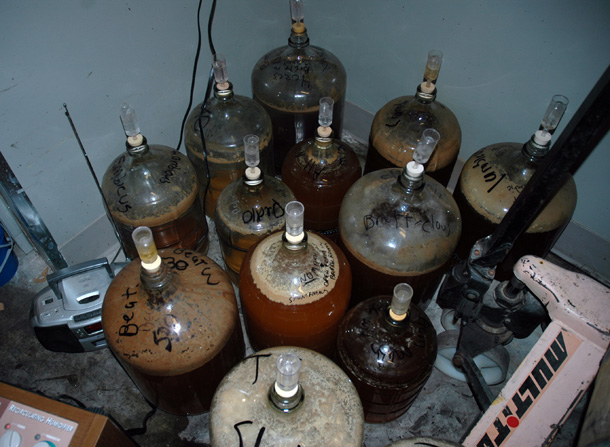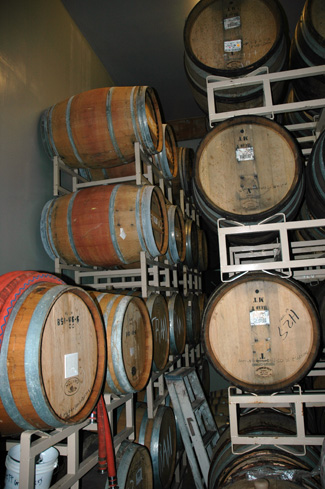Why would a beer that was once a fine representative of a style no longer be?
Boak and Bailey provoked what turned into a longread last week by asking “What’s the reference beer for each style? Especially more obscure styles, we suppose.” @BoakandBailey quickly added, “So, to clarify: reference doesn’t necessarily mean the best, just the most representative. If you’d never had style X before, would that beer help you understand it?”
Start at the top, keep scrolling, take your time, feel free to wander off into some of conversations within the conversation. I’ll wait.
QUESTION: What's the reference beer for each style? Especially more obscure styles, we suppose.
Wit = Hoegaarden
Saison = Dupont
ESB = Fuller's, obviously
Mild = ???
Gose = ???
Etc. pic.twitter.com/KuhIMP8yIy— Boak and Bailey (@BoakandBailey) October 16, 2019
At the end, @joelandrewwinn writes, “Curious to see the responses when North America wakes up tomorrow. My guess is there will be opinions.” If comments broke out, I didn’t find them. That doesn’t matter. This isn’t about the best American reference for a mild (although Rocksteady on cask at Good Word Brewing in Duluth, Ga., was awfully good Saturday before last). Or a reference for Americanized or “traditional” German pilsner, or pastry stout or whatever.
Dispatches from the brewing local front
WHAT THE L?
Fullsteam Brewery in North Carolina has made a small change in the signage it uses at beer festivals.
A line that previously read “AUTUMN LAGER festbier, 6% ABV, 99% local” now reads “AUTUMN LAGER festbier, 6% ABV, 99% L.”
Fullsteam founder Sean Lilly Wilson explained why in the brewery’s newsletter.
The goal is two-fold: first, to intentionally have people ask “What is “L?”” That question provides an opportunity for dialogue. It allows us to share what we mean by local and why we believe it matters.
Secondly, the effort is to ultimately normalize it. Why waste time on IBUs when it’s a meaningless measurement of perceived bitterness? Why bother with SRM (a color metric) when you generally know a pils is going to be light and a porter dark?
L matters to us and to a growing number of breweries. L to us means Southern-sourced (overwhelmingly North Carolina) from independent farmers, foragers, maltsters, and tree growers.
Ultimately, we want customers to care more about origin and how buying local can strengthen the state’s agricultural sector. For us and a number of L-centric breweries, that matters more than specious statistics and formulas.
Truly local beer is a metric worth measuring. But in a No Laws When You’re Drinking Claws era, we have to find new ways to make it matter.”
Fullsteam has spent more than a half million dollars on local ingredients — local being Southern states, mostly North Carolina — since opening in 2010. “I hope to ramp that up each year, to where that $500k isn’t over nine years, but every year!” Wilson wrote via email.
The ingredients and where they come from:
Malted corn: From Riverbend Malt House in Asheville and Epiphany Craft Malt in Durham.
Malted barley: Foundation, Ruby and Vienna from Epiphany.
Malted triticale: From Epiphany.
Hops: Aramis from France and Saaz from Germany.
Yeast: House lager yeast (not of North Carolina origin).
LOCAL CONNECTIONS
Via Josh Chapman at Black Narrows Brewing Co.
Saturday was the @VACraftBeer Blue Ribbon festival at the state fair. It’s a farm-forward, ag-focused fest, and one of my favorites. Jeff from @murphyrudemalt came and did mini-mashes of beers served at the fest using his malt for side by side tasting. pic.twitter.com/3Vs4ZGmmL0
— joshchapman (@joshchapman) October 7, 2019
October 25, 2018 Emma and I were on Paul & Doris’ tractor at Turtle Pace Farm planting the last row of the first ever ESVA malting barley. Today, these beautiful bags hit our dock. The best part? The journey is just beginning. pic.twitter.com/uuG0NRVmf5
— joshchapman (@joshchapman) October 11, 2019
ASSUMING YOU LIVE IN NORTHERN BOTSWANA
Malted millet, coming soon to a beer near you. Assuming you live in northern Botswana… pic.twitter.com/ImfPpV7w0v
— Lucy Corne (@LucyCorne) October 15, 2019
HOMINY
Looking forward to releasing @gracemeatthree Hominy Lager – brewed with local heirloom Bloody Butcher corn – on draft tonight at 6pm! pic.twitter.com/QfT1tjMJmt
— Perennial Artisan Ales (@PerennialBeer) October 17, 2019
Russian River Brewing ‘bugs’ circa 2006

 The carboys at the top contain many of the microbes that became part of the “Russian River bacteria blend” that contributes to the unique character of beers such as Temptation and Supplication. Details are in a story posted at Good Beer Hunting.
The carboys at the top contain many of the microbes that became part of the “Russian River bacteria blend” that contributes to the unique character of beers such as Temptation and Supplication. Details are in a story posted at Good Beer Hunting.
The photo was taken in 2006 in the barrel room of the Russian River Brewing Co. pub (at the time, its only brewery) in Santa Rosa, Calif. These days, hundreds — heck, maybe thousands — of brewers ferment beers with that they call their own unique mixed cultures. This is relatively new.
(Some might even suggest so new that we should wait to be sure the aren’t racing ahead a bit quickly.)
For “Still Friends After All These Years” I talked with brewers who have kept in touch with the same microbes (known affectionately as bugs or critters) that soured their beers for the past 15 years, and sometimes longer. Included are a few beers you may have forgotten, or perhaps never heard off.
The carboys in the photo are long gone. The blend of microbes Russian River co-founder Vinnie Cilurzo settled on is stored in plastic totes today, although he is using a new process to make Temptation and other brands these days.
He has been, and still is, generous about sharing these Russian River bugs with homebrewers. Twice he has taken wood chips aged along with Damnation, something Russian River does every twenty-third batch, and soaked them in Beatification or Sonambic, then given away “dime bags” of the chips at conferences. He also provides More Beer, a homebrew supply store, with Cabernet Sauvignon barrels that were used to make Consecration. The supplier cuts those into chunks it sells as part of a kit.
A few words about words about beer
The Unicode Technical Committee recently announced it would not add a white-wine emoji to Unicode’s standard emoji mix, despite a 19-page proposal and well-organized petition campaign supported by winemaker Kendall-Jackson.
“If certain news outlets are to be believed, white-wine drinkers everywhere were devastated,” Stephen Harrison wrote in Slate. He doesn’t particularly care one way or another, and instead poses a question “. . . more philosophical in nature, namely, whether emoji are supposed to represent broad emotions and concepts or something more specific.”
Coincidentally, last week Jonny Garrett traced “the origins of beer language, from Michael Jackson to emojis” at Good Beer Hunting.
So what changed since Heinrich Knaust wrote Funff Bücher, von der Göttlichen und Edlenn Gabe, der Philosophischen, hochthewren and wunderbaren Kunst, Bier zu brawen in 1573? (Plenty was written about beer centuries before that, but this is a blog not a complete history of beer writing, and Richard Unger calls Knaust’s book the first extensive and comprehensive work on brewing.)